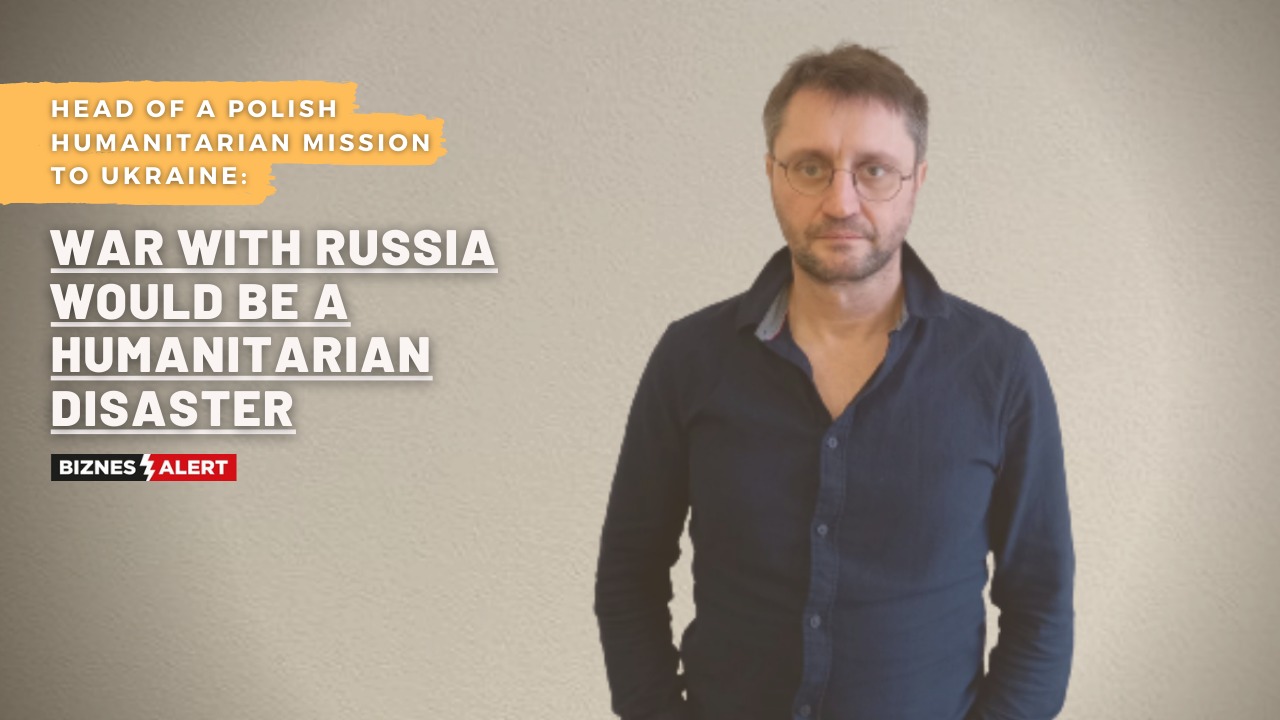If there is a war, the humanitarian situation will be catastrophic. Especially in the east of Ukraine, where the situation of the population is the worst. Many people spend on food up to 50 percent of their budget. Sometimes they are forced to choose whether to buy food or medications. Therefore, if there is a war, their situation will be fatal – said Stephane Moissaing, head of the Polish Humanitarian Action (PAH) mission to Ukraine in an interview with BiznesAlert.pl.
BiznesAlert.pl: In what conditions does the Polish Humanitarian Action in Ukraine operate in the face of the exacerbating crisis with Russia?
Stephane Moissaing: To begin with, it must be said that the crisis in Ukraine has been going on since 2014, and therefore there are many people who are in a very bad economic and social situation. Then there is the energy crisis, which is fuelling inflation, and the COVID-19 pandemic, which also has a disastrous effect on the economy. This situation puts people’s safety at risk, especially in the Donbas. Economic indicators for 2019, 2020 and 2021 were getting worse each year.
What is the scale of aid that the Polish Humanitarian Action provides to Ukraine?
As the Polish Humanitarian Action, we operate along a line that is 260 km long. We provide economic support for the local community. We provide support for vulnerable people, single mothers, people without families, people with limited mobility, and those who have been injured, for example, by stepping on landmines. Thanks to the European ECHO funds, we give financial support to those who are most in need, so that they can meet their basic needs, primarily food. We also offer administrative assistance, so that such persons are visible in the domestic documentation. We also provide food and hygiene products. Social workers visit people with reduced mobility or those who were affected by COVID-19 and need help with basic needs. We also provide psychosocial support, which is very important.
How did the COVID-19 pandemic affect the Polish Humanitarian Action in Ukraine?
We had to adapt, we use disinfectants and masks, we limit contact to the necessary minimum. If someone is sick, contact is limited to the delivery of products, and conversations with such people take place over the phone or intercom. Psychosocial assistance can also be provided-depending on the epidemic situation-by telephone or via the internet. We comply with all sanitary regulations. We want to support those who are most in need, but it is those who are most in need who are most vulnerable to the coronavirus. Nevertheless, medicines, food and hygiene products are physically delivered, because there are no other solutions.
How does the Polish Humanitarian Action compare to other charities in Ukraine?
I cannot compare the scale of support, but there is a coordination mechanism managed by a United Nations special office. Each organization operates in its area, in its scope, in terms of the form of assistance. The point is not to repeat our actions. There will always be room for improvement, but each organization has its own specialization and field of action, the goal is to complement each other. This is why PAH also cooperates with the Ukrainian government and its institutions, especially in providing services and identifying the needs of specific individuals and families in the east of the country. In areas outside the control of the government in Kyiv, for example, we work with UN agencies to transport essential products together, and with local NGOs to provide support for those most in need.
What do the people for whom you provide help on a daily basis think? Are they afraid of war or are they used to danger?
I ask this question every day to the people we help in the area where we operate. People say that they are used to danger and threats, they have also experienced war themselves. They’re still in the war zone. You can’t simply rise above something like this, which is why we have 15 psychologists working with us on a permanent basis. People suffer from depression, insomnia, feelings of abandonment and loneliness, which shows that they do not feel that these circumstances are normal. You can’t get used to war and danger. Nevertheless, people are not unanimous as to whether the risk of a new war with Russia is real or not. No one is able to predict what will happen, but nevertheless the situation is tense, and in the media there is information about the amassing of military forces on the border, and this, of course, affects the human psyche.
Let us hope that this will not happen, but what would be the humanitarian situation if Russia decided to invade Ukraine?
We constantly cooperate with other organizations, because there is a risk of direct confrontation, so we must be ready for all scenarios. If there is a war, the humanitarian situation will be catastrophic. Especially in the east of Ukraine, where the situation of the population is the worst. Many people spend on food up to 50 percent of their budget. Sometimes they are forced to choose whether to buy food or medications. Therefore, if there is a war, the situation of these people will be fatal. In the event of a conflict, there will be mass migration, there is talk of forced migration of up to 2 million people, but those who are unable to move will remain in the conflict zone. These people will surely be cut off from aid for some time. Huge numbers will be injured, especially when it comes to artillery and air attacks. That is why it is so important for us to maintain constant support for people who are already living in a humanitarian crisis – and this is possible only thanks to the support of Polish men and women, businesses and institutions.
Interview by Michał Perzyński









